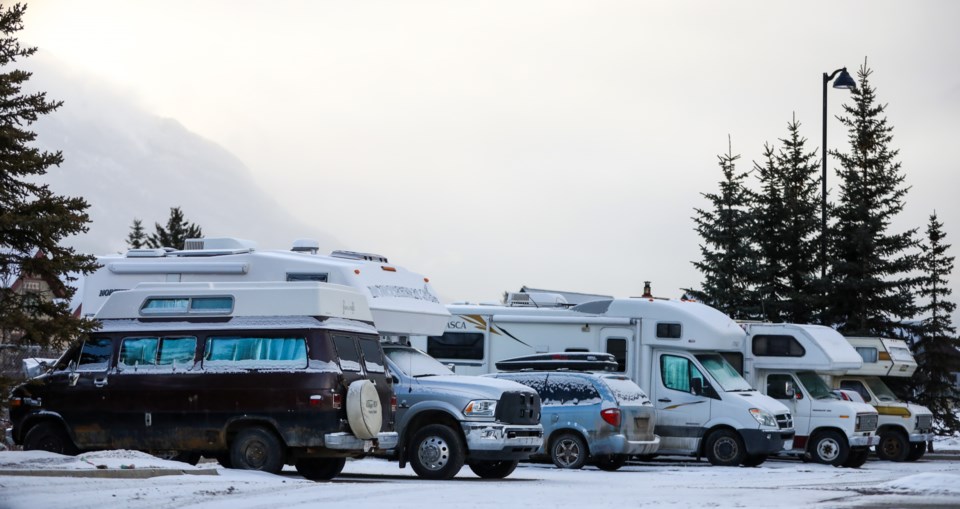CANMORE – The Town of Canmore intends to bring back its Safe Park program in 2021.
The pilot program was designed to manage the "Vanmore" issue – the increasing number of people working in the community living out of their vehicle – and was set to initially launch in spring 2020.
However, similar to the disruption COVID-19 caused for businesses and governments last March, the made-in-Canmore approach to homelessness was put on the backburner until municipal officials had a better understanding of the pandemic.
"You may recall, council approved money in the 2020 budget to look at a Safe Park program," said senior manager of municipal services Sally Caudill.
"We delayed that during COVID and some of the money was rolled into the operational budget. That will be carried forward as part of the 2021 budget and the Safe Park program will return."
In 2020, part of the funds were used to support a part-time housing coordinator position as part of the municipality's social response to the pandemic. That position was able to meet with those whose housing situation was affected by the pandemic and help them find solutions.
There was also a drop-in area created at the Civic Centre for those who may not have a place to go due to a lack of safe and secure housing to access a warm space with snacks, hot drinks and the ability to charge devices.
The approved Safe Park program was designed to run between May and October and provide 50 parking stalls in 10 lots throughout the community. Between 9 a.m. and 8 p.m. each day the spaces would return to being regular parking stalls.
Five municipal parking lots were proposed to be part of the program: three parking lot locations along the Ninth Avenue corridor downtown behind artsPlace, behind the Canmore Recreation Centre and near the Elk Run baseball diamonds.
The proximity to services like washrooms was an important consideration when looking for locations to run the pilot project. If washrooms or garbage containers were not available, they would be provided as part of the pilot project.
There were also eligibility requirements around employment with a minimum of 20 hours of work per week needed to qualify. The full-time coordinator position would screen people for eligibility, followup on any complaints, and collect data on the program.
Last April, council voted to postpone the pilot project, however it did subsequently approve a new bylaw that prohibited overnight camping in any location outside the approved Safe Park project.
The Safe Park program is managed by the Community Social Development department, which also manages Family and Community Support Services (FCSS) and the Family Resource Network (FRN).
Caudill also took the opportunity to point out to council in January that there are several budget considerations they should be aware of for those services.
FCSS is provided through a funding arrangement between the municipality and the provincial government. The Town of Canmore is required to fund 20 per cent of FCSS, while the province funds 80 per cent.
"We have contributed more than that 20 per cent in the past couple of years, but we are increasing that even more in 2021 and years beyond," Caudill said.
The amount the province has funded for FCSS has remained the same at $317,372 since 2015 when the current contract was agreed upon. However, staff who work in FCSS are on the municipality's pay grid, which means they receive cost of living increases and performance pay, when budgeted.
As a result, the 20 per cent contribution of $79,343 based on the province's contribution has increased incrementally. In 2021, it makes up 29 per cent of the total cost for FCSS or $114,033. In 2022, that moves up to 32 per cent or $125,454.
Caudill said the FRN is in the same circumstance, in that staff are part of the salary grid and are set to receive increases annually; however, there are no increases to the contracted amount paid by the province for the service, which is $359,837 in 2021.
The Town of Canmore has also committed to providing $56,011 as a base funding amount for FRN, but as time goes by that amount increases with staff being on the pay grid.
It was noted by Councillor Joanna McCallum, who sits on a Alberta Urban Municipalities Association committee that looks at health and wellness, that Canmore is not alone in this situation.
"Other municipalities are also exceeding that 20 per cent [for FCSS], or contracting that service out to a non-profit and leaving the non-profit to deal with the wages piece," McCallum said.
Mayor John Borrowman noted that the contractual arrangement with the provincial government puts the municipality in a tough situation.
"The fact that the province will not increase their contribution means the only option is to provide less services each year or to increase the municipal cost," he said.





